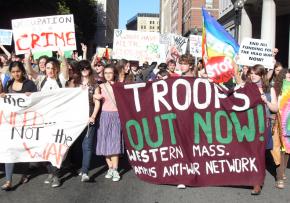Protests mark date of Iraq war vote
Hundreds of activists turned out in several cities to call for an end to the occupations of Iraq and Afghanistan.
IN SEVERAL cities across the country, antiwar activists turned out October 11 to mark the six-year anniversary of the congressional vote authorizing the invasion of Iraq.
One of the largest protests was in Boston, where 1,000 people turned out in the first citywide demonstration against the war in nearly a year.
The October 11th Mobilizing Committee, a grassroots coalition of Iraq Veterans Against the War (IVAW) members, students and activists from antiwar coalitions around the city, organized the protest. The group demanded a stop to the wars and occupations of Iraq and Afghanistan; money for jobs, education, health care and housing; no sanctions or attacks on Iran; a stop to the racist scapegoating of Arabs and Muslims; and a stop to the assault on human rights and civil liberties.
Protesters gathered for a rally on Boston Common and followed it with a march through the city's downtown shopping districts. Many people lining the streets of the march clapped their hands, waved or gave a "thumbs up" in support.

The protest came on the heels of one of the worst weeks for the economy since the Great Depression, and many people were making the connections between the war and the economy. As the demonstration snaked through Boston's narrow streets, protesters chanted, "Money for jobs and education, not for war and corporations" and "They want bailout, we say troops out."
"A lot of people feel that the war and the [economic] crisis are linked," said Rebecca Batorsky, a member of the October 11th Mobilizing Committee. "Our infrastructure is crumbling and our money is going to wars and corporations."
Speakers at the rally included members of IVAW, the Campus Antiwar Network (CAN), and activists from local antiwar coalitions. The rally also featured musical performances from Son of Nun, the Foundation and Ryan Harvey among others.
"This event should be used for bringing new people into the movement, " explained Carlos Harris of IVAW. "Soldiers I have contact with are asking, 'Why are we there?' They don't hold with the ideas of the war. They're there because they have a family to support."
Support for the protest came from area students and activists at the University of Massachusetts (UMass) at Boston.
On October 9, 300 students, veterans, faculty and staff gathered at UMass to rally and speak out against the war and demand that troops come home now at an event organized by the UMass chapter of the Campus Antiwar Network.
As one new member of IVAW eloquently put it, "Iraq has oil. That is why we are there. We shouldn't support a government that doesn't support troops when we come home today."
The rally demonstrated the tremendous anger about the U.S.'s invasive role around the world, the current bailout plan that is leaving behind many students and veterans, and the need to organize around these issues. Students from Somalia and around the Middle East made the connection between the war in Iraq, and the U.S.'s direct intervention in countries around the world.
Two days later, at the October 11 protest, members of the UMass Antiwar Coalition organized 200 students and youth from around Massachusetts and New England--including several high schools--to march together at the protest in the Boston Commons. At the protest, members of UMass Antiwar were able to share their experiences in organizing against the war on a university campus, and talk to middle, high school and college students about starting CAN chapters on their campuses.
ELSEWHERE, IN Providence, R.I., 250 people turned out to voice their opposition to the wars in Iraq and Afghanistan, and the possibility of war in Iran. The protest was organized by the Rhode Island Mobilization Committee to Stop War and Occupations.
The event began with speeches and song, followed by a march to downtown Providence. In addition to demands to bring the troops home now, marchers demanded no attacks on Iran; protect families and stop the deportations; defend civil liberties; and money for housing, education and health care--not for war.
The rift between people's basic needs and the unending flow of resources to a devastating war was at the forefront of everyone's mind, as it was in Chicago, where some 300 turned out for a march in the heart of Chicago's Pakistani community to voice their opposition to escalating war in the region--including U.S. military attacks inside Pakistan's borders.
On hand for the protest was Juan Torres, who held a picture of his son, Army Spc. Juan Torres Jr., who was killed in Afghanistan in 2004.
Also in attendance was Gloria Barrios, who held a sign in Spanish asking for "Justice for my daughter--enough with the lies of the Air Force," with a picture of her daughter Blanca Luna. Barrios has been seeking information about the death of her daughter, an Air Force reservist who was found stabbed to death in her room on Sheppard Air Force Base in Texas in March of this year.
Barrios has been fighting to gain information about the circumstances of Blanca's death, and says that the military has not been forthcoming about her daughter's murder, even when she traveled to Texas to speak to officials directly.
Members of Code Pink, the Campus Antiwar Network, World Can't Wait and others attended the protest, called by the Chicago Coalition Against War and Racism. Immigrant rights activists were also in attendance, making the connection between the war abroad and the war on immigrants at home. Signs demanded "Fund the wounded, not the war," "Impeach Bush for war crimes," and "People's needs, not Wall Street greed."


